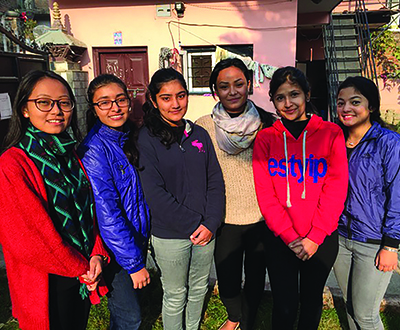The Gift of Education

“There is no tool for development more effective than the education of girls and the empowerment of women,” wrote Kofi Annan, the former secretary general of the United Nations. In Nepal, an organization called the Little Sisters Fund has been working to educate economically disadvantaged girls and empower them to become teachers, leaders, and other positive forces for growth in the country, which is among the poorest in the world. With very limited economic resources, the money that is spent on education in Nepal is likely to go to boys, especially since poor families often feel they can’t afford to lose their daughters to school, as those girls are often an important economic asset in terms of taking care of younger children and helping with the family’s agriculture. This leaves its disadvantaged girls with few choices save entering into child marriage, child labor, or sex trafficking.
Usha Acharya, author of Girl Trafficking and Child Labor in Nepal; her husband, Jayaraj Acharya, the former Nepali ambassador to the United States; and then-25-year-old Trevor Patzer, who met the Acharyas while touring Nepal, realized this imbalanced situation and established the Little Sisters Fund in 1998 to raise scholarships for Nepali girls and save them from a life of limited opportunities and potential exploitation. The fund also works with families in several supportive ways so the girls can get an education and the family isn’t adversely affected. The young women who have benefited from the Little Sisters Fund then give back to their country by mentoring their juniors and entering into such fields as health care and teaching. Empowering females is a key aspect of the organization.
A few years ago, Keene State Professor Emeritus of Education Len Fleischer and his wife, Erika Radich, learned of the Little Sisters Fund when they were visiting their daughter Siena, a USAID officer in Nepal. Grasping the importance of the fund’s mission, they decided to do what they could to help.
Fleischer, Radich, and Environmental Studies Professor Renate Gebauer have had a close affinity for Nepal for several years and have been volunteering there and leading student service trips there. Keene State’s relationship with Nepal has grown to the point at which the College is ready to welcome Nepali women who are ready to move on to a four-year degree.
Thanks to the substantial fundraising done to date by the Keene State College/Little Sisters Fund Partnership Steering Committee, as well as a significant contribution from the Little Sisters Fund and support from the College, backed by the efforts of campus community leaders, funding is currently available for tuition, room and board, and fees for two Nepali students for the first year of their undergraduate education, with a commitment for further funding from Keene State for subsequent years. The two Nepali women will begin their Keene State careers in the Fall 2017 semester. The College is the first public US college/university to have this unique partnership.
This scholarship should have a very long-lasting, long-reaching effect. “It not only would benefit an individual girl with higher education, but would provide her with something to take back to her country at the end of four years, and every summer, where she could provide mentoring and real value to her culture,” says Fleischer.
In return, the Little Sisters Fund organization in Nepal is offering internships to Keene State students who would be interested in visiting Nepal to teach English. The connection to Nepal is also deepening the College’s ties to the Nepalese refugee community in the Concord/Manchester area. Some years ago, Bhutan expelled thousands of Nepalis living there, and many of those made their way to New Hampshire. Currently, there are three students from that community at Keene State, and the College’s commitment should help more of those transplants feel welcome on campus.
“Keene State College is fully committed to establishing and advancing our partnership with the Little Sisters Fund,” says President Huot. “Not only will this endeavor provide support to economically disadvantaged girls in Nepal, it will also enrich our campus and our community at large through our engagement with these remarkable young women.”
Anyone interested in supporting this scholarship effort may contact Marilyn Shriver, Keene State’s director of Strategic Engagement, at 603-358-2371, or via email.
Learn more about giving at Keene State and make an online donation at Keene State’s Giving Page.
– Mark Reynolds
from Keene State Today, Winter 2016–17 issue pg. 19





